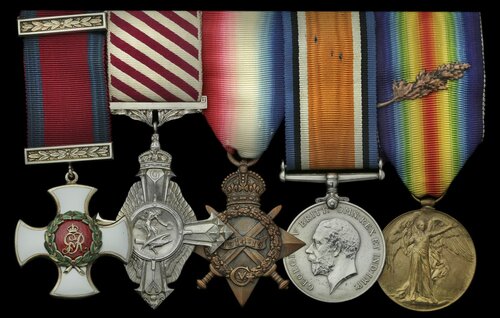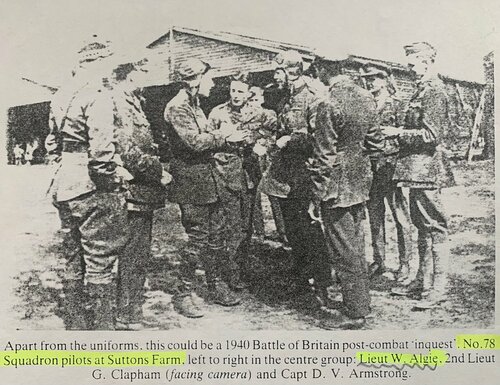Auction: 21002 - Orders, Decorations and Medals
Lot: 221
The superb 'Trench Raid 1917' D.S.O., 1919 A.F.C. group of five awarded to Captain W. Algie, Royal Flying Corps and Royal Air Force, late Corporal, 4th Dragoon Guards and 23rd Northumberland Fusiliers, who was recommended for the Victoria Cross - whilst still a Subaltern - for his remarkable actions that earned his D.S.O. during the Trench Raid near Armentiers
Having served an action-packed tour as an Observer in DH4s with the Royal Flying Corps over the Western Front, he qualified as a Pilot and added an A.F.C. for 'night flying operations over London' - also ending the Great War with three 'mentions'
Distinguished Service Order, G.V.R., silver-gilt and enamel, top riband bar adapted for mounting; Air Force Cross, G.V.R.; 1914-15 Star (D-9831 Cpl. W. Algie. 4th. D. Gds.); British War and Victory Medals, with M.I.D. oak leaves (Capt. W. Algie. R.A.F.), a little enamel chipping to wreaths on first, otherwise good very fine (5)
D.S.O. London Gazette 26 March 1917:
'For conspicuous gallantry and devotion to duty during a raid on the enemy’s trenches. He led the assaulting party with great dash and inflicted many casualties on the enemy. He himself shot eight of the enemy with his revolver. Later he skilfully withdrew his party under very heavy fire and assisted to bring in the wounded.'
The only award of the A.F.C. to the Tyneside Scottish Brigade.
A.F.C. London Gazette 3 June 1919:
'For night flying operations over London.' (Gallantry Awards - Members of the Tyneside Scottish Brigade, refers)
William Algie was born on 20 June 1889 at Glasgow and had been a farmer and market gardener at Kemps, South Ockendon, Essex from 1909-14. He first saw action during the Great War as a Corporal with the 4th Dragoon Guards, serving in France from 17 December 1914 (1914-15 Star). Having been commissioned into the 23rd Battalion (Tyneside Scottish), Northumberland Fusiliers on 2 July 1916.
His Battalion landed in France later that month were tasked with a trench raid south-east of Armentiers 11 February 1917. Under the command of Lieutenant-Colonel Perch, a force of 12 Officers and 257 other ranks were readied and organised into four Companies, with Algie was assigned as Second-in-Command of 'C' Company. As the force moved with great stealth out over No Man's Land they came under heavy German fire with two Companies being held up. 'C' Company found themselves under a hail of fire, desperately looking for the break in the wire. Lieutenant-Colonel Perch, who had attached himself to 'C' Company, charged forward onto the enemy lines, with the gallant Algie at his side. They quickly took the enemy front line, following which Algie then pulled together a Support Line Party and with his revolver to hand charged up the trench.
In the following moments, he personally killed seven German soldiers and then proceeded to throw bombs, securing the Trench all alone. He then supervised his Party blowing up an ammunition dump and a bombing HQ. Proceeding back to the old German front line, held by Lieutenant-Colonel Perch, who had seven Prisoners, including two Officers at hand, a struggle occurred. Algie once again stepped to the plate, killing one of the Officers.
With the Raid delivering its aims, the order to withdraw was given and Algie successfully lead his party and their Prisoners - with no doubt who was in charge - back across No Man's Land.
Algie was immediately put in for a Victoria Cross for his actions on that night, but this was eventually downgraded, instead he earned the rare distinction of earning the D.S.O. whilst as Subaltern, Lieutenant-Colonel Perch was also handed the same laurels for the Raid.
Algie finished his time in the Army with a brace of 'mentions' (London Gazette 26 March & 22 May 1917, refer). In May 1917 he was transferred to the Royal Flying Corps and after a short Observer course was posted to No. 25 Squadron operating in France with the DH4s from the end of May. With his regular Pilot 2nd Lieutenant Hancock, the pair forged a winning partnership, flying Photo Recce, Bombing and Special Operational Flights over the Western Front. On 9 August, in DH4 A7426, setting off at 0830hrs, the pair flew at 13,000ft over Provin-Courrieres. Engaging no less than 7 enemy machines over Henin Lietard, one was believed driven down and put in as a victory. The next day they successfully exposes 11 plates over Montingny-Bauvin and faced hostile machines over Lens. The following days were also full of action, dropping bombs on 17 August, coming into action against 8 enemy over Douai, with another believed driven down and put in as a victory. On 18 August, when attached by 5 enemy, Algie fired a drum into one of them, that turned and immediately span uncontrolled towards the ground.
Completing his tour he was selected for Pilot Training and returned home. Having qualified he was posted to No. 78 Squadron, flying out of Sutton's Farm in Sopwith Camels. Their role was Home Defence and Algie took part in a number of patrols, in the pursuit of the Gotha Bombers who were raiding attacking London and Southern England. Demobilised with his A.F.C. in August 1919, he had earned a final 'mention' (London Gazette 22 January 1919, refers). Clearly feeling the call to arms, Algie returned to the fold for the Second World War and was commissioned Pilot Officer in the Training Branch on 1 February 1941. He resigned his commission on 27 July 1945; sold together with copied research, Service Records, War Diary, ORBs and other extracts.
For his miniature dress Medals, please see Lot 339.
Subject to 20% VAT on Buyer’s Premium. For more information please view Terms and Conditions for Buyers.
Sold for
£11,000
Starting price
£3000







